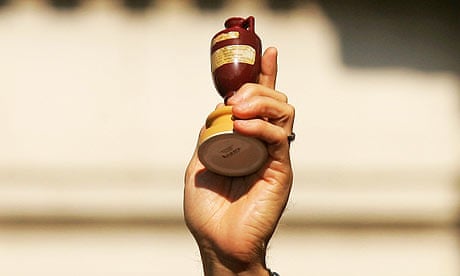If you went looking yesterday, really looking, there was a fascinating insight on the Department for Culture, Media and Sport's website into David Davies's listed-events review.
Tucked away in the publications section of the DCMS online reference library were the minutes from respondents' oral evidence. They made for interesting reading, particularly the verbal presentation given by a delegation from the BBC. The director of sports rights, Dominic Coles, the head of sport, Barbara Slater and James Heath, a BBC strategist, all supported the director general, Mark Thompson. Their message was clear: we do not want the Ashes to be listed.
Comments such as "cricket is difficult" and "one-off pinnacle sporting moments such as the final of the Cricket World Cup and the World Twenty20 [should be listed]; other events of UK importance [should] sit on the B list protected through highlights" might have seemed equivocal.
But surely there was less ambiguity in the following: "The BBC is not arguing that everything should be listed and it has no Napoleonic ambitions for cricket. It recognises the pressures on the sport and although the Ashes [are] of national resonance in the public's view they otherwise do not pass the test [for listing]." What to do? Why, list the Ashes, of course.
"I've recommended the delisting of all cricket apart from one Test series every four years," Davies said yesterday, although not one single respondent requested it. Davies also said there had been no political interference. Still, even though no one in cricket or broadcasting can see the point of it, Downing Street is said to be gleeful about the prospect of a populist vote-winner.
Best of both worlds
When it comes to England's campaign to host the 2018 World Cup, Sir Dave Richards, as we all know, can best support a successful bid without the necessity of sitting on the board. His positions as Premier League chairman, Football Association board member and chairman of the FA's international committee provide him with ample opportunities to bang the drum for English football, and the bid in particular, right across the world.
As Richards went on to say upon resignation from the England 2018 board last week: "Our challenge now is to convince the 24 [executive committee] members of Fifa." Indeed – and I am using the great man's words here – he will continue to do so wherever and whenever he can.
Only, not in South Africa it seems – even though all 24 members have descended on the republic for the World Cup draw. After his performance last week Richards is now keeping his head down and has declined to travel to the country his allies say is where he is best connected. It is probably for the best.
We can't work it out
Gerry Sutcliffe has sent another letter asking for a date to be arranged to meet football's big beasts – the Premier League's Richard Scudamore, the Football League's Lord Mawhinney and the FA's Lord Triesman – to talk again about the government's seven questions on football governance. Let's all get in a room and discuss the issues, pleads Sutcliffe. Some hope. Because, although Scudamore is happy to engage with Sutcliffe on his own, he sees FA reform as a matter for the FA, and thinks, like Sutcliffe, that the Burns review should be adopted in full. It is hard to disagree.
Unless you are the FA, which calls instead for football to work together on what it sees as "the key issues". Which rather misses the point that unless there is structural reform of the game, nobody will ever work together on anything.
Ashcroft's hornet nest
Pity poor Watford. They are less than three weeks from administration unless a wealthy investor can be found to put in £5.5m to keep them afloat. How they must wish they had a billionaire shareholder with the resources to match the multimillion-pound loans injected by directors in recent months. Hang on a minute, what about Lord Ashcroft? Doesn't he fit that description? After all, he is the club's largest single shareholder through his Fordwat investment vehicle. For some reason, though, none of Ashcroft's advisers would talk about it yesterday.
